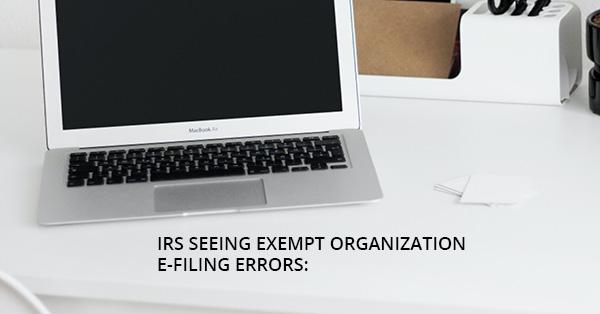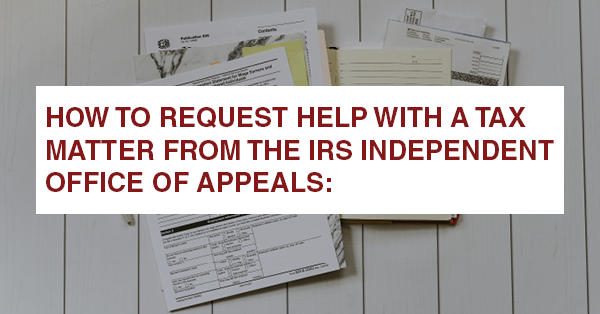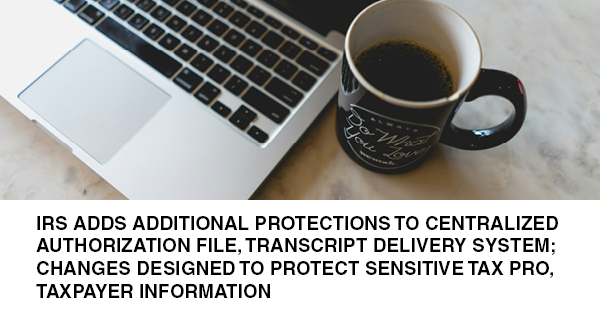IRS SEEING EXEMPT ORGANIZATION E-FILING ERRORS:

There are a number of issues “that can interfere with the successful submission of an electronically filed return,” Elaine Leichter of the IRS Tax-Exempt and Government Entities Division said August 16 during the 2022 Virtual IRS Nationwide Tax Forum.
Incorrect entity information is one such error. The heading area, above Part I of a return, asks for information that must match the information the IRS has, Leichter explained. “Errors here prevent a return from being accepted for filing,” she said.
Exempt organizations should make sure they use the correct employer identification number, Leichter said. “If the system doesn’t recognize the EIN you think belongs to your organization, the return won’t transmit through the e-file system,” she said. An organization that doesn’t know what its EIN is can contact TE/GE customer account services for help, she added.
A return occasionally gets through with the wrong EIN, particularly if the filer uses the EIN of a related entity, Leichter said.
For example, a subordinate organization under a group exemption might accidentally use the EIN of the central or parent organization, Leichter said. If the subordinate files a return bearing the wrong EIN before the parent files its return, the IRS system assumes the parent has already filed. The parent will be unable to file its return without assistance, she explained, noting that the IRS must manually undo the error.
The organization that used the wrong EIN will be treated as not having filed a return because the IRS has no valid EIN to associate with that return, Leichter said. If the error is repeated for three consecutive years, the organization using the wrong EIN will automatically lose its tax-exempt status, she said.
Automatic Revocations
Before e-filing of Form 990 series returns became mandatory, some EOs whose exemptions were revoked because they hadn’t filed returns for three straight years would respond by filing paper returns, perhaps hoping that doing so would make up for their previous failure to file, Leichter said.
But now that e-filing of EO returns is required, a revoked organization’s subsequent attempts to file will fail, Leichter said, explaining that those organizations must apply for reinstatement of exemption before their attempts to e-file a return can succeed.
If an organization seeking reinstatement needs to file back returns, the returns can be prepared on the paper version of the form and then included in the PDF of their application for reinstatement, Leichter said.
Private Foundations
Leichter said some private foundations are trying to claim exemption from the section 4940 tax on investment income by checking a box under Part V of the Form 990-PF private foundation return that asks about tax based on investment income.
That checkbox applies exclusively to a special type of private operating foundation described in section 4940(b), Leichter said. “This type of private foundation is assigned a special foundation code in our system, and the system will catch the error and will prevent the 990-PF return from transmitting if that code isn’t present in the foundation’s account,” she explained.
Private foundations should refer to the Form 990-PF instructions before checking that box, Leichter said.
E-Filing Mandatory
Leichter pointed out that the Taxpayer First Act requires e-filing of Form 990 series information returns and that there are no waivers from that requirement. Although system limitations in the early days of the e-filing mandate required some Form 990, Form 990-EZ, and Form 990-PF returns to be filed on paper, those limitations have been resolved, she said.
“So at this point, for a tax year beginning in 2020 or later, we aren’t aware of any circumstance that will prevent an organization from filing any Form 990 series electronically,” Leichter said. Every return in the Form 990 series must be e-filed unless it’s for a tax period within a transition period or for a tax year when no e-file form was available, she explained.
Paper returns for periods before e-filing requirements took effect will be processed, but those for periods after e-filing requirements became effective will be rejected and won’t be considered filed until they’re submitted electronically, Leichter said, adding that late-filing penalties will apply.
Because private foundations that must file Form 4720, “Return of Certain Excise Taxes Under Chapters 41 and 42 of the Internal Revenue Code,” are required to e-file, taxpayers who file that form must file their own returns, according to Leichter. Disqualified persons and organization managers liable for an excise tax may no longer use the same return filed by the organization, she explained.
Because 2021 was a transition year for Form 4720, the IRS didn’t require returns for the 2020 tax year to be e-filed unless the due date was on or after July 15, 2021. But any Form 4720 filed by a private foundation for tax year 2020 or later now must be filed electronically, Leichter said.
Churches
Leichter said an organization that believes it is a church should confirm that it is classified as such by the IRS.
“If we don’t have it classified as a church, it will be in our system as having a filing requirement, and failure to file can trigger automatic revocation” of exemption, Leichter said.
Leichter also said churches that incur unrelated business taxable income must file Form 990-T, “Exempt Organization Business Income Tax Return (and proxy tax under section 6033(e)).”




